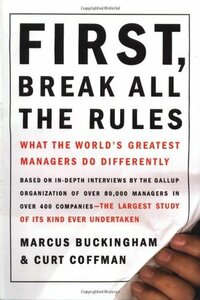Take a photo of a barcode or cover
94 reviews for:
First, Break All the Rules: What the World's Greatest Managers Do Differently
Curt Coffman, Marcus Buckingham
94 reviews for:
First, Break All the Rules: What the World's Greatest Managers Do Differently
Curt Coffman, Marcus Buckingham
Read it for a Master's course seminar, and actually enjoyed and picked up many pointers from it!
Probably more meaningful if you're a new manager, if you've been micromanaging/ed, or if you haven't had great management modeling. I have actually learned much of this from amazing managers over the years. This is the one leadership book I've read lately that I'd recommend to a select group of colleagues.
Helpful for rethinking the way that you manage a team. Some great advice with action steps. Also appreciated that the advice was based on many years of research.
I took a break whilst reading, but here I am.
Probably *the* go to management book. Being an Economics and Business graduate myself I don’t recall having it in management classes, but I definitely should have. Proper argumentation based on piles of data instead of anecdotal pseudo profound bullshit which you usually find.
Want to know the proper management practices proven in many different industries? Go grab that book.
Probably *the* go to management book. Being an Economics and Business graduate myself I don’t recall having it in management classes, but I definitely should have. Proper argumentation based on piles of data instead of anecdotal pseudo profound bullshit which you usually find.
Want to know the proper management practices proven in many different industries? Go grab that book.
I'm not a manager, but this book felt especially relevant to me since my company just did an employee survey based on the 12 questions Gallup formulated through this study. It was interesting to compare my thoughts on the survey without knowing anything about it, to learning all the mechanics and data of 'why' behind it all.
I've also been thinking about my next steps at my current company, and this provided some guidance on really taking time to figure out what I'm good, what I enjoy, and not just blindly taking the next step 'up'. The authors really pushed "excellence at every level" and I couldn't agree more. It's frustrating to see some of the more menial jobs at my company treated so flippantly. I don't care what you do, you can do it and do a great job at it. Extra effort at ALL levels should be recognized and rewarded.
The authors also did a really nice job explaining an alternate view of having to terminate employees. While it's never pleasant, great managers truly approach it in a different fashion, and that was utterly fascinating to me to see a new side of that. A point that was continually stressed througout is that people don't leave companies, they leave managers. Another oft-repeated sentiment was that of excellence and failure being surprising similar. Average is the anomaly. You can't simply infer excellence my taking the inverse of failure. The difference between the two lies in how inherent talents are executed, and often those talents are surprisingly similar.
I also really enjoyed that the advice given by exceptional managers seems to fly in the face of convention but are backed up my massive quantities of data. I.e. spend more time with your top people, not your employees that are struggling - things don't have to be fair. Speaking of the data, I also really enjoyed that seemingly subjective, qualitative data was somehow quantified and measured just like quantitative data. It really lent a lot of credence the authors' claims.
A great read - I highly recommend this to anyone, manager or not. I have a feeling I'll picking this one up again in the future.
I've also been thinking about my next steps at my current company, and this provided some guidance on really taking time to figure out what I'm good, what I enjoy, and not just blindly taking the next step 'up'. The authors really pushed "excellence at every level" and I couldn't agree more. It's frustrating to see some of the more menial jobs at my company treated so flippantly. I don't care what you do, you can do it and do a great job at it. Extra effort at ALL levels should be recognized and rewarded.
The authors also did a really nice job explaining an alternate view of having to terminate employees. While it's never pleasant, great managers truly approach it in a different fashion, and that was utterly fascinating to me to see a new side of that. A point that was continually stressed througout is that people don't leave companies, they leave managers. Another oft-repeated sentiment was that of excellence and failure being surprising similar. Average is the anomaly. You can't simply infer excellence my taking the inverse of failure. The difference between the two lies in how inherent talents are executed, and often those talents are surprisingly similar.
I also really enjoyed that the advice given by exceptional managers seems to fly in the face of convention but are backed up my massive quantities of data. I.e. spend more time with your top people, not your employees that are struggling - things don't have to be fair. Speaking of the data, I also really enjoyed that seemingly subjective, qualitative data was somehow quantified and measured just like quantitative data. It really lent a lot of credence the authors' claims.
A great read - I highly recommend this to anyone, manager or not. I have a feeling I'll picking this one up again in the future.
Appreciated the book through our work/business book club simply because the conversation helped me get to know my co-workers. I didn't agree with all of the philosophies suggested (one example: "people can't change, so get used to leveraging what they are good at" - paraphrased), but I did get a sense of where colleagues and I are in our respective careers. I am very much in a "do not promote me farther, I don't want the stress!" stage of my life, but those typically younger than me (and sometimes older!) are still very ambitious. Net = a good read, and food for thought, so I'd recommend.
Rounded up from 3.5.
Read on a suggestion from my org leadership after some reorganization within the company. While it was a bit dated in some references and case studies (Amazon.com the book retailer, Dennis Rodman, EDS and Ross Perot, etc), there was still some useful insight.
The key points boiled down to treat people as individuals, cultivate their talents, focus on outcomes rather than process, and find the approach for performance management that works best for the direct report.
Some useful ideas on addressing performance issues, which will certainly be of use for me in the coming months.
Read on a suggestion from my org leadership after some reorganization within the company. While it was a bit dated in some references and case studies (Amazon.com the book retailer, Dennis Rodman, EDS and Ross Perot, etc), there was still some useful insight.
The key points boiled down to treat people as individuals, cultivate their talents, focus on outcomes rather than process, and find the approach for performance management that works best for the direct report.
Some useful ideas on addressing performance issues, which will certainly be of use for me in the coming months.
I really liked the talent/skills/knowledge framework from this book and it will probably be my biggest takeaway. However, I’m also going to try to implement many of these strategies in our new management structure, including measuring engagement by the Q12. Time will tell how effective it is!
Pros: knowledge, skills, talents. Cons: lacks equity lens.
I finally read this book finally after having been teaching the concepts for a while. A great foundational book for leaders and organizations to utilize a strengths-based approach. Buckingham has refined his approach and philosophy since publishing this book, but the basic concepts are the same. Definite read if you want o be a transformative leader and engage employees in meaningful ways.



